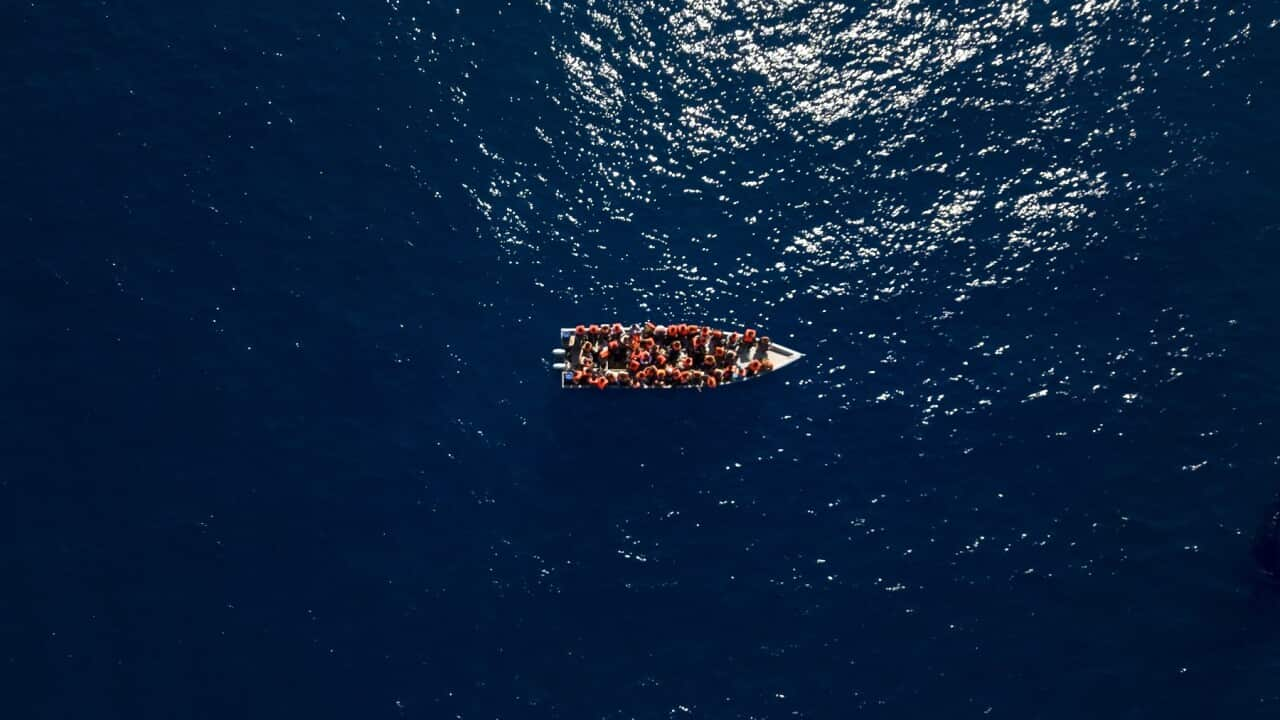TRANSCRIPT:
That's one of the personnel from Seawatch, a mostly volunteer group from Germany that patrols the Central Mediterranean, looking for boats in distress.
The group has released a video appearing to show the Libyan coast guard ramming into a small dingy carrying some 50 migrants near the coast, sinking the rubber vessel and throwing those onboard into the Mediterranean Sea.
There were no immediate reports of any fatalities or of anyone missing.
The incident appears to be the latest attempted sea interception of migrants by the Libyan coast guard, which is trained and financed by the European Union to stem the influx of migrants to Europe.
Libya has in recent years emerged as the dominant transit point for migrants - but Italy is also a focal point.
UNICEF estimates that more than 11,000 minors have crossed the Mediterranean Sea to Italy without their parents or legal guardians through migration routes since January 2023, a 60 per cent increase compared to the same period last year.
Andrea Iacomini is the UNICEF Italy spokesperson.
"Unfortunately the number of unaccompanied children in Italy has tripled in comparison with previous years. We are talking about more than 11,000 girls and boys who have arrived in our country. They are people coming from Sub-Saharan Africa, Southern Asia, also from areas where there are ongoing conflicts or climate-related problems. There is a human movement from many countries."
Nine southern European countries have now met over what they say is a growing crisis.
The one-day huddle has included host Malta, as well as Croatia, Cyprus, France, Greece, Italy, Portugal, Slovenia and Spain.
Greek Prime Minister Kyriakos Mitsotakis says it the European Union has lost control of its southern borders - and the group wants the E-U to finalise a new migration and asylum deal, and to beef up efforts to prevent departures from North Africa.
"I think we have made a lot of progress at the European level in recognising the importance of the external dimension of the migration problem. And at the end of the day, the need to determine on our own terms who enters the European Union. Because this is about us as sovereign states, but also members of a European family, exercising what is a right that we can simply not outsource to smugglers, because this is exactly what we are currently doing. It is the smugglers who decide who gets to enter the European Union and this must change."
Under current EU rules, the nation where asylum-seekers arrive must shelter them while their applications are processed.
Malta's Prime Minister Robert Abela says countries on the frontline of the crisis are under increasing pressure, and risk being overwhelmed by the current crisis.
"Clearly, irregular migration flows from the southern Mediterranean impact the whole of Europe. Tackling these flows is a priority for governments across our continent. As the MED9, we recognise the need for a sustained and holistic European response. So we urgently reiterate the call on the co-legislators to step up negotiations on the Pact on Migration and Asylum to reach agreement before the end of the current legislative term."
The Maltese prime minister says the European Union as a bloc must beef up surveillance operations of Europe’s external borders to prevent departures and break up human trafficking networks.
"The pact must ensure that the needs of frontline states will be met. The rate of return of failed asylum seekers has to be improved. It is vital that smuggling networks are dismantled, but ultimately the issue needs to be tackled at source. To help achieve that, we underlined the need to urgently build more robust, comprehensive partnerships with all our partners in the southern Mediterranean."
Member states have argued over which country should take charge of migrants when they arrive and whether other countries should be obligated to help, debates that have fuelled doubt as to whether an overhaul of the current system is possible before European elections in June.
But Slovenian Prime Minister Robert Golob says unity is key in solving the migrant crisis.
"And I think it was shown quite clearly during all the discussions today. Unity, when it comes to illegal migration - the only way forward, if we want to find a solution, is to be united. No single state, no single nation can find a solution to this really huge challenge ahead of us. And Mediterranean Basin - it is a gateway to Europe and we need to tackle the issue united. And that's what was shown today."
At the end of the summit, Kyriakos Mitsotakis has said EU countries “need to determine on our own terms who enters” the 27-nation bloc.
Mitsotakis says EU members should focus on repatriating people who are not entitled to asylum, while at the same time providing organised legal migration pathways.













